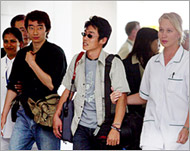Japanese media glorifies Iraq hostage
The Japanese media’s reaction to its citizens who have been taken hostage in Iraq has left many observers bewildered.

The abduction of Akihiko Saito in Iraq after an ambush on 5 May has sparked an entirely different reaction to the one that greeted the three Japanese who were taken hostage there one year ago.
While Saito, an armed private security officer, has been treated with respect and admiration at home, the two humanitarian workers and a photojournalist were subjected to a sustained attack on their actions, motives and personal lives.
When Noriaki Imai, Nahoko Takato and Soichiro Koriyama returned to Japan this time last year after their hostage ordeal, there were no celebrations and certainly no hero’s welcome.
They were criticised for their stupidity for being in Iraq, the wasting of government money on efforts to secure their release, and dirt was dug up on their families and backgrounds.
Everyone from politicians to TV hosts joined in the barrage as the media distributed tales of communist sympathies, teenage marijuana use and even underage smoking.
‘Video game hero’
Veteran media analyst and professor of journalism and mass communication at Kyoto’s Doshisha University, Takesato Watanabe, believes the media have got things the wrong way around.
“The three Japanese nationals who were abducted last year were there for humanitarian reasons, but they were against the war and the policies of the Japanese government and that is why they were attacked so severely.
|
“Saito is a Japanese citizen and as such must be helped if he’s in trouble but the meaning of his existence and activities in Iraq are plainly wrong and should be criticised” Takesato Watanabe, |
“Yet Mr Saito is just there for the money and he is portrayed as a kind of action hero, like a character straight out of a video game.”
Watanabe added: “This is part of the problem: the Japanese media and many Japanese people want to see the situation in Iraq as a kind of video game.”
Some believe the humanitarian workers’ public pronouncements of opposition to the war were at the root of the fury they provoked, despite the fact that most Japanese opposed the Iraq war from the beginning.
The families of the three ended up appearing in press conferences to apologise for the trouble they had caused, while members of the government demanded they repay taxpayers’ money that had been used on their behalf.
Ambush
All this is in stark contrast to the treatment of Saito, who has brought the shadowy world of private military companies to a fascinated Japanese public.
Private military company personnel are reported to number more than 20,000 in Iraq, making them second in size only to the US military.
 |
|
Imai (L) and Koriyama (R) were |
Saito was working for Hart Security, a Cyprus-based British-run outfit founded by former members of the SAS, the British special-forces regiment, when his convoy was attacked in a well-planned ambush.
Saito’s passport and ID have been posted on a website used by a group who previously carried out similar attacks and abductions.
It is believed he was badly injured in the ambush and whether he actually survived is unknown. The group has made no demands in connection with him.
A former paratrooper in the Japanese Self-Defence Force and 20-year veteran of the French Foreign Legion, Saito has been treated with almost awed reverence as his friends have lined up to appear on TV shows to relate stories about him.
Iraq war opposition
There has been much talk of the large salaries paid for this kind of work as well as the high level of skill and experience required.
The Japanese media has been happy to use the term “youhei”, which translates as “mercenary” or “hired soldier’, to describe Saito, although the image conveyed has been of an exciting and glamorous world.
 |
|
Japanese soldiers’ deployment |
Interestingly, in the English-language Japanese media, the word “mercenary”, with its negative connotations, has been avoided.
There is a belief in some quarters that the presence of Saito in Iraq helps to legitimise the activities of the Self-Defence Force (SDF), whose members are engaged mainly in guard duties in the most active deployment of Japanese troops since the pacifist constitution was imposed by the US after WWII.
Doshisha University’s professor Watanabe says the Japanese government has been keen to show Saito in a positive light as if he has been working for the security of Japan itself.
There is no doubt that there was a good deal of opposition to sending troops to Iraq among those who feel uncomfortable with anything that rekindles memories of Japan’s militaristic past.
Media criticised
However, the media has been keen to establish the distinction between professionals such as Saito or the SDF, and “misguided do-gooders” such as the three taken hostage last year.
The Sankei newspaper, in an editorial about Saito, said: “This is very different from previous abduction cases as Mr Saito is a trained professional with much experience.”
But Watanabe maintains that the perspective of the mainstream Japanese media and the government is way off the mark.
“Saito is a Japanese citizen and as such must be helped if he is in trouble, but the meaning of his existence and activities in Iraq are plainly wrong and should be criticised.”